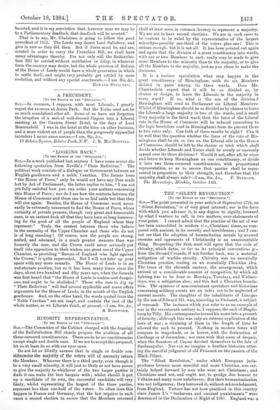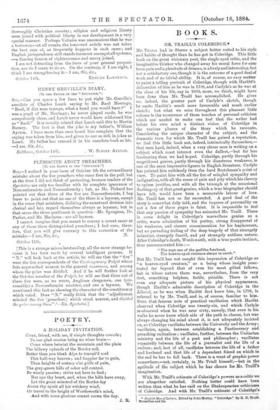THE "SILENT REVOLUTION."
[To THE EDITOR OF THE "SPECTATOR."] SIR,—The point presented in your article of September 27th, on "Silent Revolution," is of very great interest; nor is the force with which you advance it, to any degree to signify, lessened by what I venture to call, in two matters, over-statements of your point. I cannot admit that the practice of the art of war has been unmodified in modern (i.e., Christian) times, as com- pared with ancient, in its severity and horribleness ; and I can- not see that the adoption of humanitarian morals by avowed enemies and opponents of Christianity is an unaccountable thing. Respecting the first, most will agree that the code of chivalry, which dates, so far as its principal conventions gc, from the Second Crusade, if not further back, was a material mitigation of warlike atrocity. Chivalry was an essentially Christian practice, resting on an essentially Christian idea. The truce of the eleventh century, the arrangement, which arrived at a considerable amount of recognition, by which all fighting was to be done on Mondays, Tuesdays, and Wednes- days, was a mitigation also ; and this had a Christian founda- tion. The opinions of non-combatant spectators and historians concerning military events are an index not to be neglected of current morals. The slaughter of the inhabitants of Limoges by the son of Edward III. was, according to Froissart, a subject of reproach. The instance which you refer to as an example of war in the seventeenth century is, I suppose, the sack of Magde- burg by Tilly. His contemporaries turned his name into a proverb of ferocity; although this was only an extreme application of the laws of war ; a straining of them in the length of time he allowed the sack to proceed. Nothing in modern times will compare in magnitude, or in horror, with the destruction of Carthage or of Jerusalem ; nor even with that scene of despair, when the Senators of Capna devoted themselves to the fate of Sardanapalus. Nor can we imagine a heathen historian utter- ing the merciful judgment of old Froissart on the passion of the Black Prince.
The "Silent Revolution," under which European juris- prudence became more merciful and more Christian, was cer- tainly helped forward by men who were not Christians ; and Christians need not, and ought not, to grudge due honour to Voltaire and many more unbelievers. But their humanitarianism was not indigenous; they borrowed it, without acknowledgment, from England. Torture has not been practised in this country since James L's "barbarous and unusual punishments" were denounced in the Declaration of Right of 1689. England was a
thoroughly Christian country ; religion and religious liberty were joined with political liberty in our development in a very special manner. Perhaps Voltaire was unconscious that he was borrower,—at all events, the borrowed article was not taken the best care of, as frequently happens in such eases; and English jurisprudence still stands foremost amongst all systems, —a flaming beacon of righteousness and mercy joined.
I am not detracting from the force of your general proposi- tion, nor do I mean to do so. On the contrary, if I am right, I think I am strengthening it.— I am, Sir, &c.,



































 Previous page
Previous page